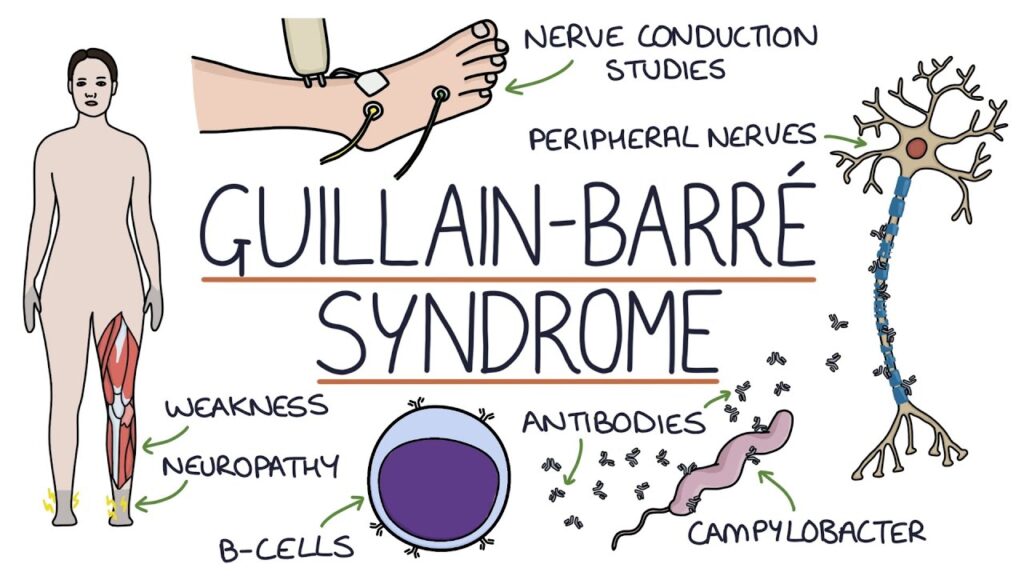Introduction:
Guillain-Barré Syndrome, often referred to as GBS, is a complex neurological disorder that affects peripheral nerves outside the brain and spinal cord. In this empathetic exploration, we aim to shine a light on the intricacies of this condition.
Understanding GBS:
Guillain-Barré Syndrome goes by several names, including Acute Inflammatory Demyelinating Polyneuropathy and Landry’s Ascending Paralysis. It is marked by:
- Swift Onset of Muscle Weakness: GBS is characterized by the immune system’s inadvertent attack on the peripheral nervous system, leading to rapid muscle weakness.
- Initial Sensory Changes: Symptoms often begin with changes in sensation or pain, frequently in the back, coupled with muscle weakness. These sensations typically start in the feet and hands and can spread to the arms and upper body.
- Potential Severity: GBS symptoms can develop over hours to weeks, and during its acute phase, it can be life-threatening. Approximately 15 percent of patients may experience breathing muscle weakness, necessitating mechanical ventilation.
- Autonomic Nervous System Involvement: In some cases, GBS can affect the autonomic nervous system, resulting in irregularities in heart rate and blood pressure, which can be perilous.
Signs and Symptoms:
GBS is a diverse condition with a range of manifestations, including:
- Tingling, numbness, and pain, often followed by muscle weakness in both legs and arms.
- Weakness in the neck muscles and cranial nerves, leading to facial muscle weakness, swallowing difficulties, and eye muscle weakness.
- Variations in the degree of weakness, with some experiencing only leg weakness.
- Pain-related symptoms, such as back pain, painful tingling, muscle pain, and headaches, related to brain lining irritation.
- In many cases, GBS follows an infection, like an upper respiratory tract infection or diarrhea, occurring 3–6 weeks before neurological symptoms.
Diagnosis and Care:
Diagnosing GBS relies on symptoms and neurological examination, including assessing deep-tendon reflexes. While lumbar punctures and blood tests can provide supporting information, they should not delay treatment.
Treatment and Compassionate Support:
GBS is a potentially life-threatening condition that demands hospitalization for close monitoring. Care includes:
- Breathing Support: Monitoring breathing, heartbeat, and blood pressure. If breathing is compromised, ventilators are used.
- No Known Cure: While there’s no cure for GBS, treatment focuses on symptom management and shortening its duration.
- Immunotherapy: During the acute phase, therapies like plasma exchange and intravenous immunoglobulin are employed to address the autoimmune nature of the disease.
- Rehabilitation: For those with persistent muscle weakness, rehabilitation services help regain strength and mobility.
Physiotherapy’s Vital Role:
Physiotherapy plays a pivotal role in GBS care, divided into three phases:
1. Acute Phase:
- Focuses on respiratory care, with gentle breathing exercises to counter muscle weakness.
- Ensures patients are positioned to keep their lungs clear and minimizes the risk of bed sores.
- Passive movements are performed to prevent joint stiffness and pain.
2. Rehabilitation Phase:
- Gradual introduction of exercise to build strength.
- Proper positioning to support circulation and prevent blood clots.
- Monitoring blood pressure and the use of compression stockings.
- Consideration of orthotic support for peripheral joints.
3. Ongoing Rehabilitation:
- Incorporation of hydrotherapy to support weight during exercise.
- Attention to posture and balance.
- Balance retraining and advanced skills like stair climbing.
- Regular stretching exercises to prevent muscle tightness.
In the compassionate care journey of Guillain-Barré Syndrome, physiotherapy serves as a vital companion, aiding patients in their quest for improved mobility, strength, and overall well-being.
Conclusion:
Through empathy, understanding, and a holistic approach to care, we hope to support those facing Guillain-Barré Syndrome. Each step forward, no matter how small, is a testament to the strength of the human spirit. We stand alongside you on this path to recovery and well-being.

